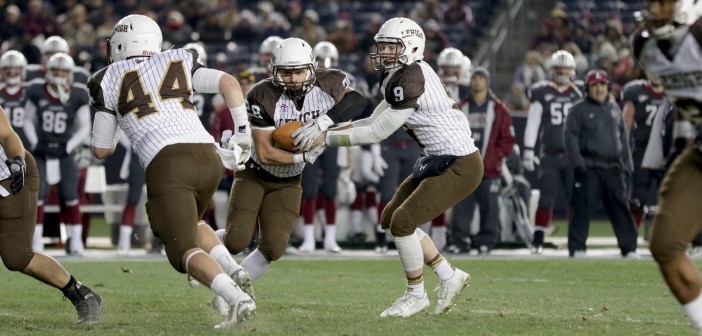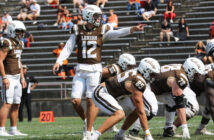In its most recent season, the Lehigh football team faced many difficulties, particularly on the defensive side of the ball. The team finished last in scoring defense, total defense, rushing defense, passing defense, sacks, interceptions, and stops on third and fourth down.
Finishing with a 3-8 Patriot League record and a 27-7 loss to rivals Lafayette College at Yankee Stadium, coach Andy Coen decided it was time for a complete review of the program.
“We’ve got to get better,” Coen said. “We’ve got to get better at recruiting players, and we’ve got to develop the players in our program. That’s two years in a row that we’ve been spanked by (Lafayette) after winning five in a row. We’ve got to look at everything from A to Z.”
Coen said this is the lowest point the program has been since he arrived at Lehigh as an assistant in the 1990s.
“To be 3-8 here is unacceptable, it is a marked departure from where we have been in the prior four or five years,” he said.
Furthermore, Coen said that the idea of the team faltering so resoundingly at Yankee Stadium against its rival continues to bother him and helped lead to the prompting of the review. He does not see the loss as a microcosm of the season. Rather, he views it as the failure to accumulate the strides the team had made over the course of the season. The season featured a lot of younger players and other veterans who had not played as much, especially many of the seniors.
During the season, Coen said the team had realized that they did not have the pieces necessary to play the 3-4 set a Lehigh defense normally runs. It became about “just trying to survive” according to the coach. Coen said the evaluations of the defense going forward have to take into account both the schemes in which they play and personnel, particularly the position in which they put each of the players.
He also acknowledges that there was much inconsistency during the season, but also great improvement.
“From week one to really week 10, we had made significant improvement, like giving up over 100 yards less some games,” Coen said.
Defensive coordinator Joe Bottiglieri attributes the improvement over the course of the season to the players, particularly the younger ones that made up the bulk of the defense.
“We were a little more basic, and I think that allowed them to do less thinking and play faster,” Bottiglieri said.
Sophomore linebacker Colton Caslow acknowledged that all the players on the defense were not all on the same page. Caslow believes if players emphasized doing their assignment instead of trying to make a big play, things will improve.
“Everyone kind of worried about making every play instead of doing their job,” Caslow said.
While the offense played statistically better in comparison to the defense, both players and coaches acknowledge that work still has to be done. Coen said that he is not anticipating major offensive changes considering it was a young team led by a young quarterback in sophomore Nick Shafnisky. Shafnisky said that while there were games in which the offense played well and the defense did not, such as the loss at Yale University, there were other games, such as the second half of the Lafayette game, in which the defense played better.
In addition, Coen decided not to make any changes to the coaching staff, considering he just hired several new coaches after the former offensive coordinator Dave Cecchini was hired as the coach at Valparaiso University and took several assistants with him. Coen said he picks his coaches very carefully.
“The same things that I valued when I hired Dave and the other guys that have been coaching here were the same things I saw in the men that have come in here to coach,” Coen said.
However, now that the season is over, players and coaches both acknowledge that the next challenge is how to go forward from here.
“It starts with everyone’s attitude,” Shafnisky said. “We can either pout now this offseason, not do well during spring ball, not do hard lifting every day in the weight room and have sour mood all the time, or we could change something about it and bring the Lehigh tradition that everyone knows back, which is winning Patriot Leagues, winning seasons, beating Lafayette, and everything everyone knows Lehigh football actually is.”
Coen aims to make sure this change in attitude occurs by revamping the offseason requirements on and off the field. For example, out of concern that players were not getting sufficient nutrition in the offseason, all players are now required to sign into one of the dining halls every morning to ensure that they are eating breakfast before going to their first class.
The program has a “renewed sense of discipline and accountability that our players are taking advantage of,” Coen said.
This has led to a renewed engagement in the Lehigh Athletics Leadership Academy, a relationship that had not been as active in recent years. The changes on the field entail more tackling during preseason and practice, something that had been scaled down due to concerns over concussions and other health concerns. He sees a direct correlation between this scale back and the struggles the defense has had with tackling.
“Earlier in the season, we were very cognizant, trying to do the right thing in terms of concussion prevention and those things that are always on the table,” Coen said. “We didn’t practice as much in our preseason camp, we didn’t tackle as much during the season, trying to keep guys healthy. I probably went overboard.”
However, one of the most crucial pieces to the rebuilding according to Coen is the recruiting class. This year features a larger-than-usual, 31-member class. This larger number is meant to provide depth and competition across the positions.
Providing depth has become especially important in the wake of player injuries sustained last year and the 25 seniors graduating in May. As a result, there were only 57 team members at this year’s spring practice, which could be detrimental due to the practice’s physical nature.
This class however is a big reason why Coen is optimistic about the future of the program. This depth is especially evident at tailback, with the team’s most commonly used backs, Rich Sodeke and Brandon Yosha, leaving the program due to graduation and injuries, respectively.
Other positions of concern were linebacker and offensive line, where many injuries occurred last year. With this goal of a bigger class in mind, there was more of a push to land recruits earlier than usual, which led to six commitments by December. The earlier push will become more widely used in future years due to the later start of second semester and the desire to have recruits visit with students on campus.
Another emphasis in this class was reinforcing geographic areas where Lehigh has been historically strong, yet weak in recent years, such as southern New Jersey and western Pennsylvania. Additionally, the new class reinforces other areas of strength such as northern and central New Jersey, Florida, and to a lesser extent, Georgia, North Carolina and South Carolina.






Comment policy
Comments posted to The Brown and White website are reviewed by a moderator before being approved. Incendiary speech or harassing language, including comments targeted at individuals, may be deemed unacceptable and not published. Spam and other soliciting will also be declined.
The Brown and White also reserves the right to not publish entirely anonymous comments.